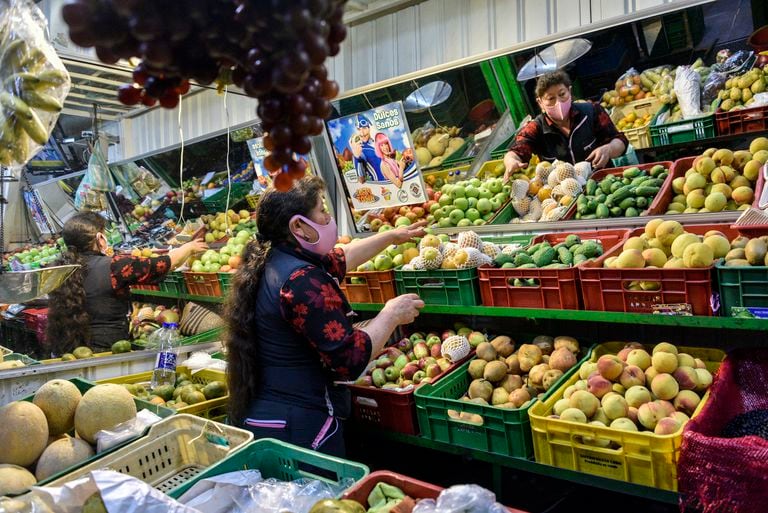A fruit stall in the Corabastos market in Bogotá, Colombia.GUILLERMO LEGARIA / Getty Images
The Coronavirus has devastated the economies in Latin America and the Caribbean, but the prospects are improving, at least those of the International Monetary Fund (IMF).
According to its most recent projections, the region will grow 4.1% this year - a higher estimate than the 0.5% made in October.
“Vaccination campaigns in some countries in December have raised hopes of an eventual end to the pandemic,” says the report released Tuesday, “In addition, economic data released after the October report suggests a stronger than projected momentum in average, in all regions during the second half of 2020. "
After Asia (excluding China), Latin America will be the worst hit region in the world in terms of the fall in gross domestic product in 2020, with 7.4% of GDP lost due to the pandemic.
The Fund estimates that Mexico will grow 4.3% in 2021 and Brazil, 3.6%.
In October, the organization estimated that both economies would grow only 0.8% this year, so the new projections are significantly higher.
Next year, Mexico could see a 2.5% expansion and Brazil 2.6%.
“However, the increase in infections at the end of 2020 (including the new variants of the virus), the new confinements, the logistical problems with the distribution of vaccines and the uncertainty about the acceptance of the vaccine, are important counterpoints to the news. favorable.
Much remains to be done on the economic and health policy fronts to limit the lingering damage from the severe 2020 contraction and ensure a sustained recovery, ”the organization said.
For the IMF, three key questions remain to be resolved in order to know for sure what the economic recovery will be like this year.
The first is, how will short-term restrictions affect the recovery before vaccines begin to provide effective protection throughout society?
The second is about how public policies and vaccination campaigns can boost activity.
Finally, the third question is how will financial conditions and commodity prices evolve?
The latter will be of great importance for the countries in South America whose economies depend, to a large extent, on these exports.
Oil prices are expected to increase in 2021 by just over 20% from the lowest price seen in 2020, the Fund said, but will still remain well below their 2019 average. Oil prices are also expected to rise. Non-oil raw materials rise in line with metals, which are expected to see a strong acceleration in prices this year.
"Despite the high and growing number of victims of the pandemic, economic activity appears to be adapting to moderate contact-intensive activity over time," says the report.
Additional policies announced in late 2020, especially in the United States and Japan, are expected to provide further support in 2021 and 2022 to the global economy.
These developments indicate a stronger starting point for the 2021-2022 global outlook than anticipated in the previous forecast. ”
The Fund noted that last year's economic meltdown has had a stronger impact on women, the youth, the poor, informal employees and those working in intensive contact sectors.
The contraction of world GDP in 2020 will be 3.5%, said the organization, an improvement of 0.9% from its last estimate published in October and is due to a faster recovery in the second half of the year in some regions of the world.
The strength of the recovery will vary significantly between countries, the IMF said, and will depend on access to medical treatment, the effectiveness of support policies, exposure to contagion effects between countries and the structural characteristics of the crisis.
The Fund called for multilateral cooperation to control the Covid-19 pandemic.
"Such efforts include strengthening funding for the COVAX initiative to accelerate access to vaccines for all countries, ensuring universal distribution of vaccines, and facilitating access to affordable therapies for all," says the report, referring to the an initiative of the World Health Organization that brings together governments, health organizations, manufacturers, scientists, the private sector, and civil society to prevent vaccines and treatments for the Covid-19 disease from reaching only the countries with the greatest resources.
“Many countries, particularly low-income developing economies, entered the crisis with high debt that is projected to increase further during the pandemic.
The world community will need to continue working closely to ensure adequate access to international liquidity for these countries.
When sovereign debt is unsustainable, eligible countries should work with creditors to restructure their debt under the Common Framework agreed by the G20, ”the report noted.

